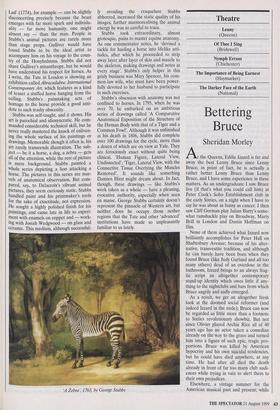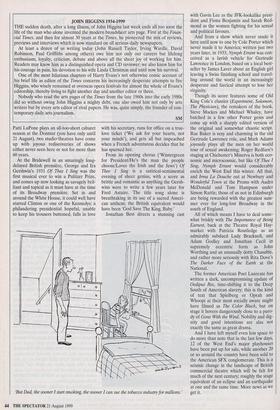Theatre
Lenny (Queens) Of Thee I Sing (Bridewell) Nymph Errant (Chichester) The Importance of Being Earnest (Haymarket) The Darker Face of the Earth (National)
Bettering Bruce
Sheridan Morley
At the Queens, Eddie Izzard is far and away the best Lenny Bruce since Lenny Bruce; in point of fact, he is actually a rather better Lenny Bruce than Lenny Bruce, and I have some experience in these matters. As an undergraduate I saw Bruce live (if that's what you could call him) at Peter Cook's Soho Establishment club in the early Sixties, on a night when I have to say he was about as funny as cancer. I then saw Cliff Gorman play Julian Barry's some- what ramshackle play on Broadway, Marty Brill in London and Dustin Hoffman on film.
None of them achieved what Izzard now brilliantly accomplishes for Peter Hall on Shaftesbury Avenue; because of his alter- native, transvestite tradition, and although he can barely have been born when they found Bruce (like Judy Garland and all too many others) dead of an overdose in the bathroom, Izzard brings to an always frag- ile script an altogether contemporary stand-up identity which owes little if any- thing to the nightclubs and bars from which Bruce angrily and sadly emerged.
As a result, we get an altogether fresh look at the doomed social reformer (and indeed Izzard in the nude); Bruce can now be regarded as little more than a footnote to Sixties revolutionary showbiz. But not since Olivier played Archie Rice all of 40 years ago has an actor taken a comedian already on the way to the grave and turned him into a figure of such epic, tragic pro- portions. Bruce was killed by American hypocrisy and his own suicidal tendencies, but he could have died anywhere, at any time. He had after all died the death already in front of far too many club audi- ences while trying in vain to alert them to their own prejudices.
Elsewhere, a vintage summer for the American musical past and present; while Patti LuPone plays an all-too-short cabaret season at the Donmar (you have only until 21 August), two studiortheatres have come up with joyous rediscoveries of shows either never seen here or not for more than 60 years.
At the Bridewell in an amazingly long- delayed British premiere, George and Ira Gershwin's 1931 Of Thee I Sing was the first musical ever to win a Pulitzer Prize, and comes up now looking as savagely bril- liant and topical as it must have at the time of its Broadway premiere. Set in and around the White House, it could well have starred Clinton or one of the Kennedys; a philandering presidential hopeful, unable to keep his trousers buttoned, falls in love with his secretary, runs for office on a true- love ticket ('We ask for your hearts, not your minds'), and gets all but impeached when a French adventuress decides that he has spurned her.
From its opening chorus (Wintergreen for President/He's the man the people choose/Loves the Irish and the Jews') Of Thee I Sing is a satirical-sentimental evening of sheer genius, with a score as brittle and romantic as anything the Gersh- wins were to write a few years later for Fred Astaire. The title song alone is breathtaking in its use of a sacred Ameri- can anthem; the British equivalent would have been 'God Save The King, Baby.'
Jonathan Best directs a stunning cast But Dad, the sooner I start smoking, the sooner I can sue the tobacco industry for millions.' with Gavin Lee as the JFK-lookalike presi- dent and Fiona Benjamin and Sarah Red- mond as the women fighting for his sexual and political favours.
And from a show which never made it here until now to one by Cole Porter which never made it to America; written just two years later, in 1933, Nymph Errant was con- ceived as a lavish vehicle for Gertrude Lawrence in London, based on a local best- seller by James Laver about an English girl leaving a Swiss finishing school and travel- ling around the world in an increasingly desperate and farcical attempt to lose her virginity.
Though its score features some of Old King Cole's classics (Experiment, Solomon, The Physician), the remakers of the book, Steve Mackes and Michael Whaley, have batched in a few other Porter gems and come up with a sharply edited version of the original and somewhat chaotic script. Rae Baker is sexy and charming in the old Gertrude Lawrence role, and Mark Adams joyously plays all the men on her world tour of sexual awakening; Roger Redfam's staging at Chichester's Minerva is both eco- nomic and microcosmic, but like Of Thee I Sing, Nymph Errant would considerably enrich the West End this winter. All that, and Irma La Douche out at Newbury and Wonderful Town at the Proms with Audra McDonald and Tom Hampson under Simon Rattle; those of us not in Edinburgh are being rewarded with the greatest sum- mer ever for long-lost Broadway in the south of England.
All of which means I have to deal some- what briskly with The Importance of Being Earnest, back at the Theatre Royal Hay- market with Patricia Routledge as an admirably subdued Lady Bracknell, and Adam Godley and Jonathan Cecil in supremely eccentric form as John Worthing and an unusually dotty Chasuble, and rather more seriously with Rita Dove's The Darker Face of the Earth at the National.
The former American Poet Laureate has written a dark, uncompromising update of Oedipus Rex, time-shifting it to the Deep South of American slavery; this is the kind of text that Spielberg or Oprah and Whoopi at their most socially aware might have filmed as The Color Black, but on stage it hovers dangerously close to a paro- dy of Gone With the Wind. Nobility and dig- nity and good intentions are alas not exactly the same as great drama.
And I have left myself even less space to do more than note that in the last few days, 12 of the West End's major playhouses have been put up for sale, while another 20 or so around the country have been sold to the American SFX conglomerate. This is a seismic change in the landscape of British commercial theatre which will be felt for much of the next century; roughly the stage equivalent of an eclipse and an earthquake at one and the same time. More news as we get it.



























































 Previous page
Previous page